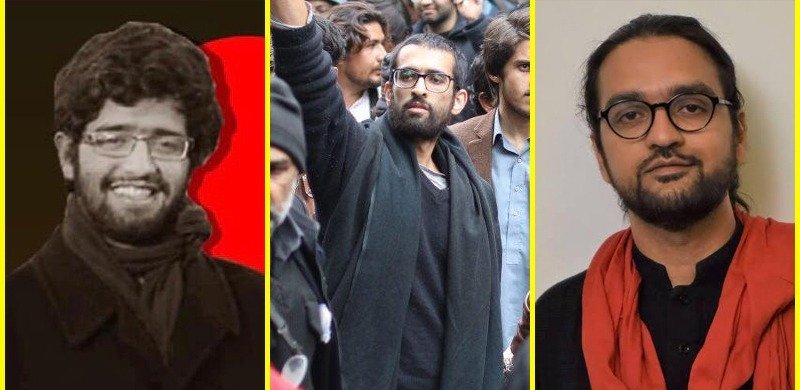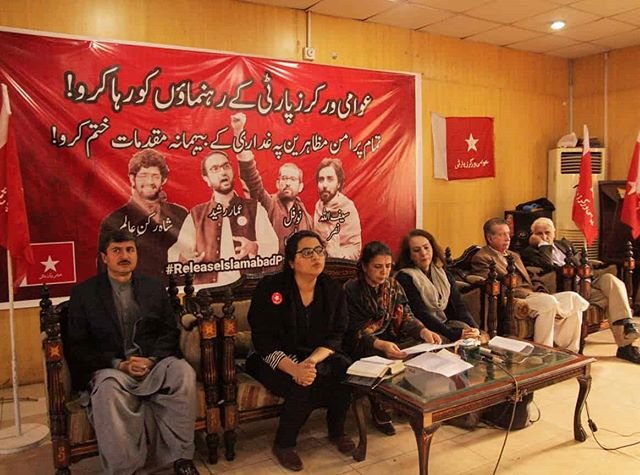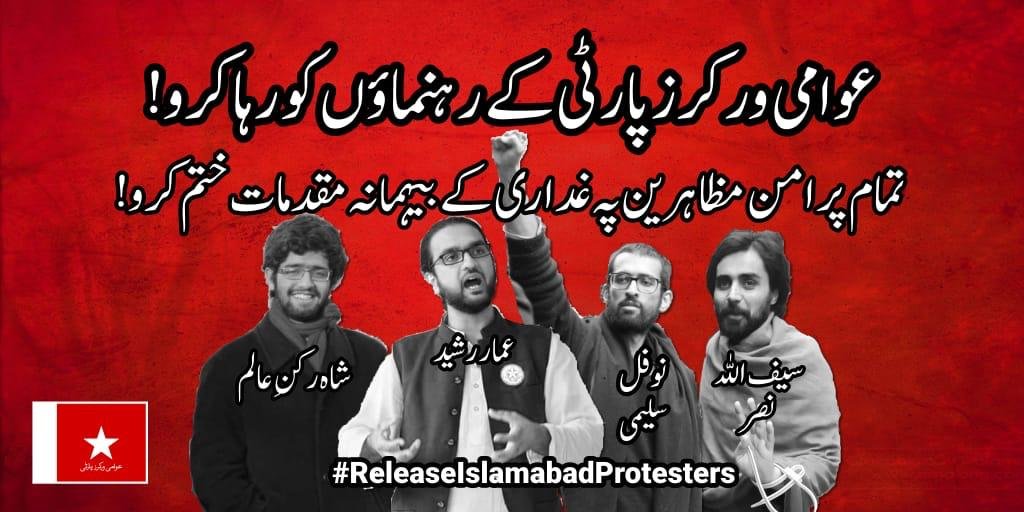Politicians, rights defenders, academics, researchers, economists, students of internationally reputed universities, strongly react on the arbitrary arrests and express solidarity with the AWP, PrSF activists
High Asia Herald Report
While Prime Minister Imran Khan boasts of having the support of a majority of Pakistani youth, his government is targetting the former throwing them behind bars and implicating them in fake sedition cases. His hollow promises and U-turns have disillusioned the 130 million youth. The PTI government instead of fulfilling its promises of providing 10m jobs to youth, 5m houses to the people, is throwing them behind bars and instituting sedition cases against the youth leaders, professors and students for raising their voice against injustices and state repression. The latest example is the arrest of Awami Workers Party Punjab President Ammar Rashid, AWP members — Naufil Saleemi and Saifullah Nasar — and Shah Rukn-e-Alam an activist of the Progressive Students Federation (PrSF) for exercising their constitutional fundamental right to protest and right to freedom of expression.
These activists were arrested on January 28 at a protest organised by the Pashtun Tahaffuz Movement (PTM) against the arrest of the social movement’s chief Manzoor Pashteen. The police also arrested 23 other protesters including MNA Mohsin Dawar, AWP deputy secretary-general Ismat Shahjehan, Women Democratic Front activist Maria Malik, PrSF activist Muneeba Ibrahim. Dawar, Ismat, Maria, and Muneeba were released late in the night after hours of detention.
Later, on January 30, a sessions judge hearing their application for bail suggested they could be tried under the Anti-Terrorism Act while denying them bail.
Are the arrested activists ‘terrorists’, as the authorities dubb them? Is raising voice for oppressed nationalities including Pashtuns and marginalised segment of society terrorism? Their crime is that they have spoken for and expressed solidarity with the oppressed people of Balochistan, Sindh, Seraiki, Gilgit-Baltistan, Kashmir, Hazara, and other marginalised communities, just as they have done for women, girls and so many more.
The arbitrary arrests spared massive criticism on social media from political activists, academia, researchers and rights activists across the country and abroad.
Teachers, researchers, students, artists, economists, policymakers at Harvard University have expressed solidarity with the activists and announced to hold a protest rally at Harvard T stop, Harvard Square, to raise a voice against what they called the State’s aggression against peaceful protesters in Pakistan and on charging them with treason.
In a statement posted on their Facebook page, the organisers stated: “These are citizens who work in Pakistan with dreams, hopes and aims to make the country a better and more livable place for all. Safe, for our children, elderly, women, men, and especially those who have been made to feel marginalized because of their identity. Is this treason?
“There are many of us, students, teachers, researchers, artists, economists, policymakers, trainers, who plan, hope and dream to go back to work in Pakistan. We are endlessly involved in working with and for a better Pakistan, in varying capacities. How is it that the moment one begins to ask for rights from the State, one is branded an agent, an outsider, a provoker, an instigator? Equal and fundamental human rights are not negotiable.
“Demanding these rights is not a privilege. How does the State prioritize hiring foreign social media influencers to promote a positive image of the country, and yet do a crackdown on its own teachers, students, and thinkers? Our rights are what we embody within us as citizens of Pakistan. And it is the duty of the state to protect those rights, rather than usurp them. And it will be our endless duty to remind the state of its job and its limitations.”
“We stand in solidarity with the protesters who bravely and peacefully come out on the streets to demand a better Pakistan, our Pakistan,” the statement read.
The staff at the Institute of Development Studies (IDS) have also expressed their solidarity with researchers and students, including IDS alumni Ammar Rashid.
They are greatly concerned that Ammar, along with 23 other young leaders and scholars, have been detained and sent to prison without bail.
Professor Melissa Leach, Director, Institute of Development Studies, said: “We are deeply distressed by the news of Ammar’s and his colleagues’ arrests.”
“These researchers and students are committed to a democratic future in Pakistan, and the way they have been treated must not go unchallenged. Censorship, the undermining of the right to free speech and the suppression of peaceful protest have no place in a democracy.”
“We stand in solidarity with Ammar and his colleagues, and call for their immediate release.”
Dr Shandana Khan Mohmand, Research Fellow, Institute of Development Studies, UK, and former tutor to Ammar Rashid, said: “Ammar is a brilliant scholar and committed to a fairer, democratic and prosperous Pakistan.”
“Ammar and his colleagues work tirelessly and peacefully to speak out against injustices in Pakistani society and profile the plight of those who are marginalised, poor and oppressed. Yet their efforts have been rewarded with injustice and suppression that is deplorable.
“These young people should be celebrated not imprisoned, and I join with others to call for their immediate release, ” she asserted.
The activists were detained perhaps for asserting that they are part of a generation of young people in Pakistan that have grown up in the shadow of the ‘war on terror’ and have time and again demonstrated their commitment to democratic and progressive causes, spoken out against bigotry and abuse of power, and have a sustained track record of excellence in professional field.
The AWP leaders — federal deputy secretary-general Ismat Shahjehan, Federal Committee member Dr Farzana Bari, Punjab information secretary Tooba Syed veteran progressive politicians Afrasiab Khattak and Farhatullah Babar and senator Usman Kakar addressing a press conference the other day insisted that no incitement to violence let alone seditious language was used, and, in fact, the protesters were attacked by the police in what most video evidence of the arrests confirms was a pre-planned strategy to break up the demonstration and then haul the protestors into police vans. The sedition case in Islamabad follows a similar case lodged against organisers of the Students Solidarity March on 29th November 2019 in which one arrested man, Alamgir Wazir, remains behind bars.
According to the leaders the complete militarization of the state – and now the law and judicial apparatus – confirms that there is nothing like a ‘democratic’ government in place in contemporary Pakistan and instead of that all institutions and processes are being completely subverted by the coercive apparatus of the state and the ruling party. Former senator Afrasiab Khattak rightly said that virtually all mainstream political parties have abandoned the struggle and submitted to the establishment whereas leaders and workers of the AWP and its affiliated student organization are being charged with crimes against the state when their only crime is to speak for the democratic freedoms of all of Pakistan’s people, and particularly oppressed ethnic-nations, women, religious minorities and the working poor.
The young activists’ only crime is that they are committed to creative and critical thinking. They are musicians, writers, and thinkers who think about their society and wish to transform it for the better. They speak against the hate written in educational curriculums, against myopic foreign and strategic policies and for freedom of expression on campuses, in the media, politics, and society at large.
Furthermore, they recognise that Pakistan is a diverse society but all ethnic-nations, women, religious minorities and many more Pakistanis are subject to systematic discrimination.
They also speak for the poor and have been active in mobilisations against the arbitrary bulldozing of katchi abadis, street vendors, people affected by mega development projects, workers of state-owned enterprises facing privatisation and downsizing, and many more. They care about future generations whose very right to life is threatened by war, environmental degradation and a rapacious economic model that is based purely on profit. They raise the consciousness of other youth so that collectively we can build a peaceful and sustainable future.
They struggle for a Pakistan that is federal, democratic and committed to the welfare of all its people. It is imperative that the rulers of this country, and the unelected apparatuses of the state most of all, recognize that the building of a peaceful, progressive and prosperous Pakistan is dependent on the politically conscious youth of today and that if their rights are not protected, then the establishment will responsible for putting the entire country’s future in the balance.
There is perhaps no institution that better reflects the still essentially colonial nature of the Pakistani state than that which is supposed to dispense justice to the people. Since it came into existence under our British masters, the lower judiciary with which ordinary masses come into contact every day, that which claims to uphold the ‘rule of law’, has functioned as a barely disguised tyranny.
The AWP and PrSf activists along with 19 other young men whose crime was that they stood outside the Islamabad Press Club to peacefully protest state repression, are now themselves being put through the grinder of our judicial apparatus.
Who are the young activists? and what is their crime? Here is all you need to know about the detained activists.
Ammar Rashid
Ammar Rashid is a researcher, political worker, and musician. He was recently elected as president of the AWP Punjab chapter.
A graduate of the Lahore University of Management Sciences (LUMS) and Sussex University, London, Ammar has taught at Quaid-i-Azam University and at the Pakistan Institute of Development Economics (PIDE). His professional work has centered around the political economy of education, housing, health, and gender.
Regularly performing revolutionary songs and poetry at political events, Ammar wears his commitment to the people and youth of Pakistan on his sleeve.
He, along with his fellow protesters are society’s conscience.
Saifullah Nasar
Saifullah Nasar is an academic, political worker and an anthropologist, who has been associated with the AWP since 2017. With a master’s degree in anthropology from Central European University, Hungary, Saif’s thesis examined the interaction and evolution of tribe and state in post-colonial Balochistan. Saif has also worked as a researcher at Humboldt University, Berlin.
Nawfal Saleemi
Noufil Saleemi is a finance graduate from LUMS, who recently got admission at Oxford University. He has been associated with the AWP for several years and is a co-author of the AWP policy paper on “Alternative to Austerity and Neoliberalism in Pakistan”.
Shah Rukn-e-Alam
Shah Rukn-e-Alam is a researcher and a student, currently pursuing his MPhil in economics at QAU. He recently joined the AWP’s student wing, the Progressive Students Front. He is committed to creative, critical thinking and cares deeply for encouraging freedom of expression in Pakistan.

The High Asia Herald is a member of High Asia Media Group — a window to High Asia and Central Asia



